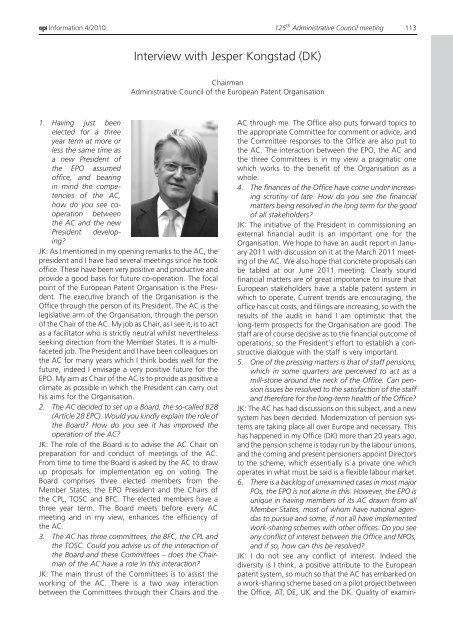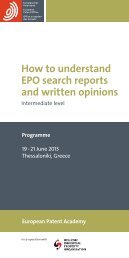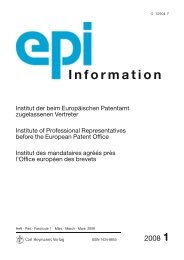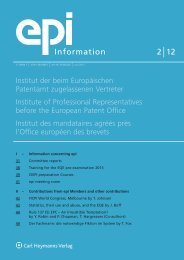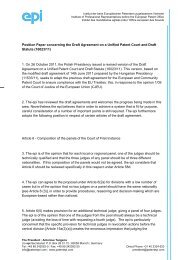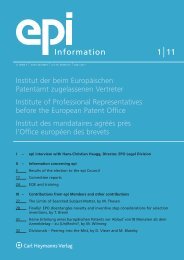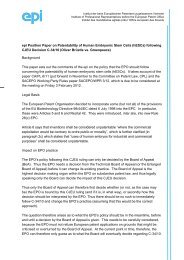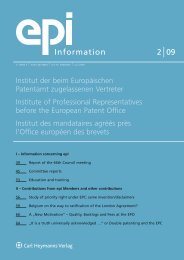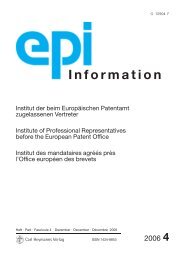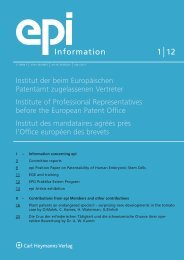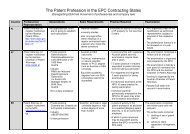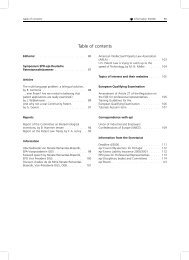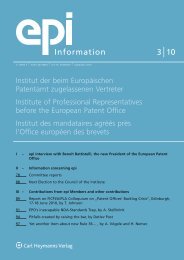epi Information 4/2010
epi Information 4/2010
epi Information 4/2010
- No tags were found...
You also want an ePaper? Increase the reach of your titles
YUMPU automatically turns print PDFs into web optimized ePapers that Google loves.
<strong>Information</strong> 4/<strong>2010</strong> 125 th Administrative Council meeting 113Interview with Jesper Kongstad (DK)ChairmanAdministrative Council of the European Patent Organisation1. Having just beenelected for a threeyear term at more orless the same time asa new President ofthe EPO assumedoffice, and bearingin mind the competenciesof the AC,how do you see cooperationbetweenthe AC and the newPresident developing?JK: As I mentioned in my opening remarks to the AC, thepresident and I have had several meetings since he tookoffice. These have been very positive and productive andprovide a good basis for future co-operation. The focalpoint of the European Patent Organisation is the President.The executive branch of the Organisation is theOffice through the person of its President. The AC is thelegislative arm of the Organisation, through the personof the Chair of the AC. My job as Chair, as I see it, is to actas a facilitator who is strictly neutral whilst neverthelessseeking direction from the Member States. It is a multifacetedjob. The President and I have been colleagues onthe AC for many years which I think bodes well for thefuture, indeed I envisage a very positive future for theEPO. My aim as Chair of the AC is to provide as positive aclimate as possible in which the President can carry outhis aims for the Organisation.2. The AC decided to set up a Board, the so-called B28(Article 28 EPC). Would you kindly explain the role ofthe Board? How do you see it has improved theoperation of the AC?JK: The role of the Board is to advise the AC Chair onpreparation for and conduct of meetings of the AC.From time to time the Board is asked by the AC to drawup proposals for implementation eg on voting. TheBoard comprises three elected members from theMember States, the EPO President and the Chairs ofthe CPL, TOSC and BFC. The elected members have athree year term. The Board meets before every ACmeeting and in my view, enhances the efficiency ofthe AC.3. The AC has three committees, the BFC, the CPL andthe TOSC. Could you advise us of the interaction ofthe Board and these Committees – does the Chairmanof the AC have a role in this interaction?JK: The main thrust of the Committees is to assist theworking of the AC. There is a two way interactionbetween the Committees through their Chairs and theAC through me. The Office also puts forward topics tothe appropriate Committee for comment or advice, andthe Committee responses to the Office are also put tothe AC. The interaction between the EPO, the AC andthe three Committees is in my view a pragmatic onewhich works to the benefit of the Organisation as awhole.4. The finances of the Office have come under increasingscrutiny of late. How do you see the financialmatters being resolved in the long term for the goodof all stakeholders?JK: The initiative of the President in commissioning anexternal financial audit is an important one for theOrganisation. We hope to have an audit report in January2011 with discussion on it at the March 2011 meetingof the AC. We also hope that concrete proposals canbe tabled at our June 2011 meeting. Clearly soundfinancial matters are of great importance to insure thatEuropean stakeholders have a stable patent system inwhich to operate. Current trends are encouraging, theoffice has cut costs, and filings are increasing, so with theresults of the audit in hand I am optimistic that thelong-term prospects for the Organisation are good. Thestaff are of course decisive as to the financial outcome ofoperations, so the President’s effort to establish a constructivedialogue with the staff is very important.5. One of the pressing matters is that of staff pensions,which in some quarters are perceived to act as amill-stone around the neck of the Office. Can pensionissues be resolved to the satisfaction of the staffand therefore for the long-term health of the Office?JK: The AC has had discussions on this subject, and a newsystem has been decided. Modernization of pension systemsare taking place all over Europe and necessary. Thishas happened in my Office (DK) more than 20 years ago,and the pension scheme is today run by the labour unions,and the coming and present pensioners appoint Directorsto the scheme, which essentially is a private one whichoperates in what must be said is a flexible labour market.6. There is a backlog of unexamined cases in most majorPOs, the EPO is not alone in this. However, the EPO isunique in having members of its AC drawn from allMember States, most of whom have national agendasto pursue and some, if not all have implementedwork-sharing schemes with other offices. Do you seeany conflict of interest between the Office and NPOs,and if so, how can this be resolved?JK: I do not see any conflict of interest. Indeed thediversity is I think, a positive attribute to the Europeanpatent system, so much so that the AC has embarked ona work-sharing scheme based on a pilot project betweenthe Office, AT, DE, UK and the DK. Quality of examin-


